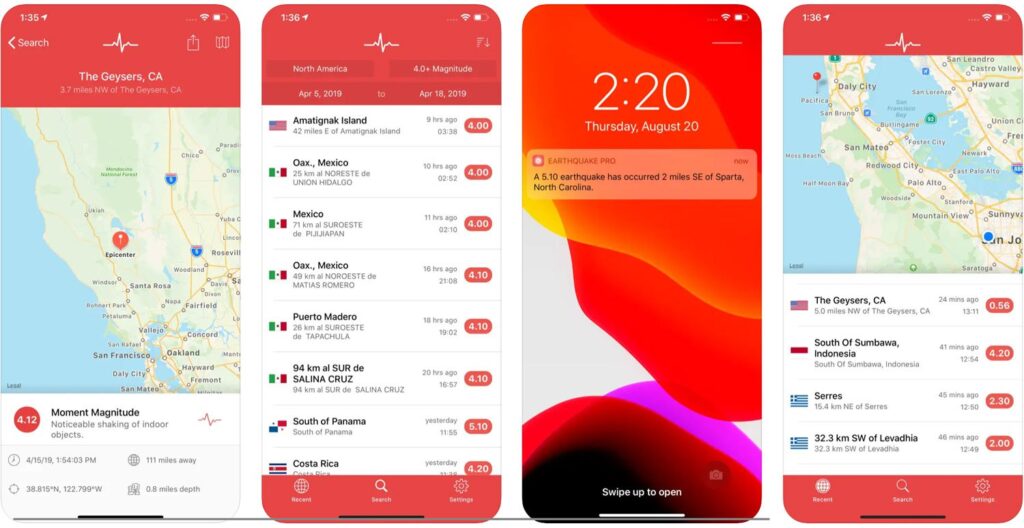Earthquake alerts IPA are one of the most destructive natural disasters, but they can also be predicted with enough warning. Earthquake alerts APK, maps, and information are important tools to help predict and plan for when earthquakes might occur. This article explains what earthquake alerts, maps, and information are available and how they can be used to help prepare for earthquakes.

Earthquake Alerts
Earthquake alerts are a valuable tool to help predict the severity of an upcoming earthquake. They come in two forms: automatic and manual. Automatic alerts use data from seismic instruments to determine if an earthquake is about to occur. Manual alerts are triggered when a computer or seismologist manually signals that an earthquake is about to happen.
How to Install Earthquake Alerts IPA on iPhone iPad without computer?
Benefits of Earthquake Alerts
Earthquake alerts provide valuable information. They can provide an estimate of the intensity of an earthquake, helping to predict its impact on structures and populations. Earthquakes alerts also provide an early warning to people in affected areas, giving them time to prepare and reduce the damage from an earthquake. Finally, earthquake alerts can provide invaluable data to seismologists, helping them to better understand earthquakes and their effects.
Earthquake Alerts APK MOD Android
The Earthquake Alerts APK MOD Android is an incredibly useful tool for anyone living in an area prone to seismic events or who just wants to be prepared in case of an emergency. It provides real-time quake alerts for earthquakes and aftershocks in your area, as well as detailed seismic activity information and detailed map of all recent quakes in your region. Plus, its quick and easy to install and use, making it ideal for anyone with an Android device. With its powerful quake alert technology and intuitive interface, the Earthquake Alerts APK MOD Android is a must-have for anyone needing quake-related information.
Uses of Earthquake Alerts
Earthquake alerts can be used in a variety of ways. They can be used to trigger alarms to warn people in affected areas of an impending earthquake, and to alert emergency services so they can respond quickly. Earthquake alerts can also be used to shut off vulnerable infrastructure like gas pipelines or electrical grids. Finally, they can be used to inform media outlets so they can inform the public about the most important facts.
Earthquake Alerts IPA MOD iOS
Earthquake Alert! IPA MOD iOS offers the most reliable and savviest way to stay informed about earthquakes. With its comprehensive early warning system, feasible Earthquake alerts can now reach users within seconds of sensing tremors. It utilizes artificial intelligence and machine learning to detect earthquakes, and it notifies users with location-based notifications for nearby quakes. The intuitive user interface of IPA MOD iOS helps users to customize push notifications to get timely updates of quakes near their area. The app also allows users to share the alert on their social media accounts by simply tapping a button. Get peace of mind with Earthquake Alerts IPA MOD iOS!
Earthquake Maps
Earthquake maps provide a geographic overview of where and when earthquakes occur. They are generated by collecting seismic data from earthquake alerts and displaying it on a map. The maps show the locations of earthquakes, as well as their respective magnitudes, depths, and approximate times of occurrence. They also show what types of earthquakes have occurred in a certain area.
Benefits of Earthquake Maps
Earthquake maps are a helpful tool for understanding the risks and intensity of earthquakes. By seeing where earthquakes have occurred in the past, it is easier to gauge the potential risk of future earthquakes. This can be especially useful for geologists, civil engineers, and planners, who can use the information to identify vulnerable regions or other risk factors.
Uses of Earthquake Maps
Earthquake maps can be used in a variety of ways. They can be used to identify areas at greater risk of earthquakes and plan appropriate strategies. They can also be used to track ongoing seismic activity and help predict future earthquakes. Earthquake maps are also a valuable tool for emergency services, helping them to coordinate evacuation and relief efforts in the event of a natural disaster.
Earthquake Information
In addition to alerts and maps, earthquake information such as background data and research studies can be used to gain a greater understanding of earthquakes and their effects. This information can include geological data, research studies, and news reports. It can provide insight into the causes and impacts of earthquakes, as well as ways to respond and adapt to them.
Benefits of Earthquake Information
Earthquake information can be a valuable source of knowledge for seismologists and researchers. By studying the data, they can gain a better understanding of earthquakes, their causes, and their effects. This information can help inform disaster relief efforts, making it easier to respond quickly and effectively in the event of an earthquake.
Uses of Earthquake Information
Earthquake information can be used to raise awareness and improve preparation efforts for future earthquakes. This information can be used to inform public safety protocols and create early warning systems. It can also help inform media outlets so they can provide timely and accurate information to the public.
Download Earthquake alerts
Earthquake alerts, maps, and information are valuable tools to help predict and prepare for earthquakes. They can provide detailed information about the intensity and risk of earthquakes, helping to alert people in affected areas and coordinate relief efforts. They can also inform researchers and scholars, creating a greater knowledge of earthquakes and their effects. Earthquake alerts, maps, and information are an essential tool in minimizing the devastation of an earthquake and ensuring a better prepared and informed public.


Comments 0
Comment on